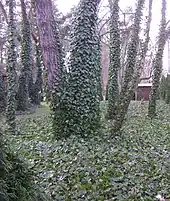ivy
English

Ivy growing near and climbing up trees.
Etymology
From Middle English ivi, from Old English īfiġ, from Proto-West Germanic *ibig, *ibag, *ibah, from Proto-Germanic *ibahs (compare West Flemish iefte, Low German Eiloov, Ieloof, German Efeu), from Proto-Indo-European *(h₁)ebʰ- (compare Welsh efwr (“black elder”), Ancient Greek ἴφυον (íphuon, “spike-lavender, Lavandula Spica”)).
Pronunciation
- enPR: īʹvē, IPA(key): /ˈaɪvi/
Audio (US) (file) - Rhymes: -aɪvi
Noun
ivy (countable and uncountable, plural ivies)
- Any of several woody, climbing, or trailing evergreen plants of the genus Hedera.
- 2023 March 8, “Network News: Pwllheli 'box gets a makeover”, in RAIL, number 978, page 22:
- Hidden timber elements, lintels and roof tiles have also been replaced, in addition to gaining a new paint job and guttering drainage, and the removal of ivy that was damaging the exterior.
- (by extension) Any similar plant of any genus.
Hyponyms
- (plants in Hedera): See Hedera.
Derived terms
Terms derived from ivy
- Algerian ivy (Hedera algeriensis)
- American ivy (Parthenocissus quinquefolia)
- Boston ivy (Parthenocissus tricuspidata)
- Cape ivy (Delairea odorata)
- coliseum ivy (Cymbalaria muralis)
- common ivy (Hedera helix)
- devil's ivy (Epipremnum aureum)
- eastern poison ivy (Toxicodendron radicans)
- English ivy (Hedera helix)
- European ivy (Hedera helix)
- German ivy (Delairea odorata and Senecio mikanioides)
- gout ivy (Ajuga)
- grape ivy (Parthenocissus tricuspidata)
- ground ivy, ground-ivy (Glechoma hederacea)
- ivied
- ivy arum (Epipremnum aureum)
- Ivybridge
- Ivy City
- ivy geranium (Pelargonium peltatum)
- ivy gourd (Coccinia grandis)
- ivy-leaf, ivy-leaved
- Ivy League
- ivy-leaved toadflax (Cymbalaria muralis)
- ivy of Uruguay (Cissus striata)
- ivy owl (Strix aluco)
- ivy tree (Schefflera heptaphylla)
- Japanese ivy (Parthenocissus tricuspidata)
- Kenilworth ivy (Cymbalaria muralis)
- marine ivy (Ampelopsis cordata, Cissus incisa)
- Mexican ivy (Cobaea scandens)
- Natal ivy (Senecio macroglossus)
- Oxford ivy (Cymbalaria muralis)
- parlour ivy (Senecio mikanioides)
- poison ivy, poison-ivy (Toxicodendron radicans)
- purple ivy (Rhododendron catawbiense)
- red-flame ivy (Hemigraphis alternata)
- sulphur of ivy
- Swedish ivy (Plectranthus verticillatus)
- switch ivy (Leucothoe fontanesiana)
- wax ivy (Senecio macroglossus)
- weeping ivy (Ficus benjamina)
- western poison ivy (Toxicodendron rydbergii)
- West Indian ivy (Marcgravia spp.)
Translations
plant of the genus Hedera
|
- The translations below need to be checked and inserted above into the appropriate translation tables. See instructions at Wiktionary:Entry layout § Translations.
Further reading
 ivy on Wikipedia.Wikipedia
ivy on Wikipedia.Wikipedia  Hedera on Wikispecies.Wikispecies
Hedera on Wikispecies.Wikispecies
This article is issued from Wiktionary. The text is licensed under Creative Commons - Attribution - Sharealike. Additional terms may apply for the media files.